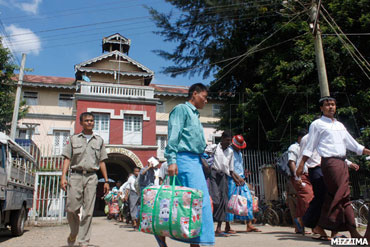(Mizzima) – An updated political prisoner database has accounted for 1,572 political prisoners in Burma who have been unjustly detained and arrested for exercising their fundamental freedoms, according to the Assistance Association for Political Prisoners (Burma).
 The AAPP says there are at least 1,572 individuals in Burma who have been arrested and sentenced on political grounds and are believed to be in prison now. The location of 918 political prisoners has been confirmed and documented, the AAPP said in a press release on Friday.
The AAPP says there are at least 1,572 individuals in Burma who have been arrested and sentenced on political grounds and are believed to be in prison now. The location of 918 political prisoners has been confirmed and documented, the AAPP said in a press release on Friday.
The figures are based on an ongoing secondary verification process to confirm political prisoners’ current whereabouts. For example, whether they are in prison now or have been released. The verification process is ongoing, and this does not mean there are only 918 political prisoners in Burma, the AAPP said. The number of political prisoners is likely much higher, given the lack of access and reliable information in remote ethnic areas, monasteries, and during periods of mass arrests, compounded by the lack of prison transparency in Burma, it said. The number of verified political prisoners is expected to continue to increase as the verification process continues.
The list of 1,572 political prisoners is available on the AAPP website (aappb.org). It includes political prisoners whose current whereabouts have been verified and those whose locations are still under investigation. The verification process is critical to securing the release of all political prisoners, because of the lack of transparency in the current government, it said.
There are two stages to the political prisoner verification process. The first, beginning in September 2011, confirmed that the motivation behind the arrest of each individual in AAPP’s database is political. During this stage, the AAPP said it documented 1,572 individuals who meet the AAPP’s official criteria for a political prisoner.
The second stage, still underway, involves verifying the current whereabouts and updating the status of the 1,572 political prisoners who have been arrested and are strongly believed to be in prison.
The AAPP said it relied on various credible sources of information in to accurately report on the current political prisoner. The main sources of information are:
1. Inside networks
2. Confidential inside sources
3. Court trial files
4. Recently released political prisoners
5. Families of political prisoners
The AAPP said there are 42 documented prisons, 109 forced labor camps, and an unknown number of secret detention centers.
State authorities and prison administrators are highly resistant to public monitoring and publishing information about prison systems, it said. The lack of transparency and openness blunts public accountability and reform efforts. Prisoner lists are not publicly available, and prisoner releases and prison transfers are rarely announced in advance, whether publicly or privately, to prisoners’ family members.
The AAPP called on the Burmese government to:
1. Officially acknowledge the existence of political prisoners in Burma.
2. Publicly disclose criteria for political prisoners, as well as make prisoner lists publicly available.
3. Authorize an independent investigative body, perhaps UN-led, to enter Burma’s prisons and verify the number of political prisoners.
4. Immediately and unconditionally release all political prisoners and purge their criminal records.


